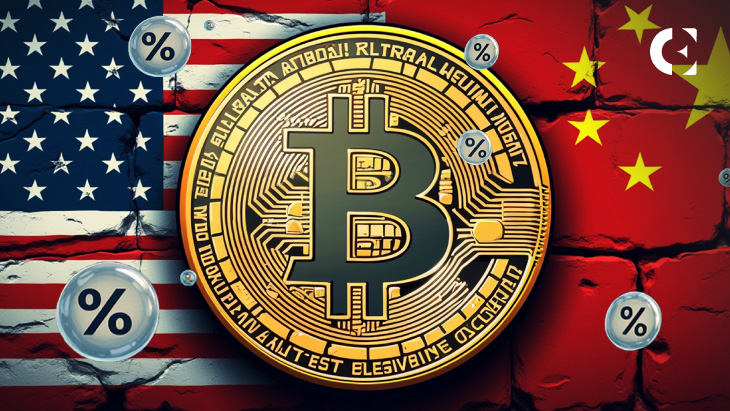- China raised tariffs on U.S. imports from 84% to 125%.
- The move follows the U.S. increase in tariffs on Chinese goods.
- China said it would respond to no further tariff hikes from the U.S.
China will increase tariffs on U.S. imports to 125% starting April 12, 2025. The move follows the U.S. decision to raise tariffs on Chinese goods to the same rate. Beijing calls the U.S. action a violation of trade rules and economic norms.
China Responds to U.S. Tariff Increase
The State Council Tariff Commission announced the tariff hike today, April 11. The new rate will replace the previous 84% tariff set in March. The decision follows the U.S. government’s April 10 announcement to raise tariffs on Chinese exports to 125% under a “reciprocal tariff” plan.
China’s new tariffs will apply to many imported goods from the United States. The commission said that U.S. products are not viable in the Chinese market at the current tariff level.
Related: Billionaire Investor Ray Dalio Warns that Tariffs are Only the Beginning
“Given that there is no market acceptance for U.S. goods at this level, China will ignore further moves by the United States,” the statement said. The new measures are based on China’s Tariff Law, Customs Law, and Foreign Trade Law, along with principles of international law.
In addition to the tariff hike, the commission said all provisions outlined in its previous announcements will continue to apply. These earlier measures covered lists of affected products and tariff schedules.
Finance Ministry: U.S. Tariff Strategy “A Joke”
Meanwhile, China’s Finance Ministry condemned the latest U.S. actions. “Even if the U.S. continues to impose higher tariffs, it will no longer make economic sense and will become a joke in the history of world economy,” the ministry said.
However, if the U.S. insists on continuing to infringe on China’s interests substantially, China will resolutely counterattack and fight to the end,” the statement said.
U.S. Tariff Policy and Global Response
Earlier this month, the U.S. imposed a broad set of “reciprocal” tariffs. While many countries received a 90-day suspension of those tariffs, China was pointedly denied this delay.
In a social media post, President Trump accused China of showing “a lack of respect” for global markets and announced an immediate hike to 125%.
In Europe, German Finance Minister Joerg Kukies said the EU may consider its response if talks with the U.S. failed. He urged the EU to take a nuanced approach, noting Europe’s trade surplus in goods and deficit in services. He also called for strengthening Europe’s digital services to reduce reliance on U.S. providers.
Crypto Market Trades Sideways
This rapid escalation in US-China trade friction immediately impacted cryptocurrency markets, creating significant volatility. Bitcoin, for instance, dropped below $74,000 before recovering to around $81,500. Around the same time, Ethereum traded lower, slipping over 2% in 24 hours to near $1,548.
Related: Tariff Shock Reveals a Two-Tier Crypto Market: BTC vs Everyone Else?
Analysts attribute the decline to investor concerns over global economic slowdown and rising inflation driven by the tariff war. Although the immediate impact has been bearish, some market watchers suggest that cryptocurrencies like Bitcoin could gain long-term appeal.
They believe Bitcoin can serve as a hedge against economic instability, especially if geopolitical tensions persist.
Disclaimer: The information presented in this article is for informational and educational purposes only. The article does not constitute financial advice or advice of any kind. Coin Edition is not responsible for any losses incurred as a result of the utilization of content, products, or services mentioned. Readers are advised to exercise caution before taking any action related to the company.







